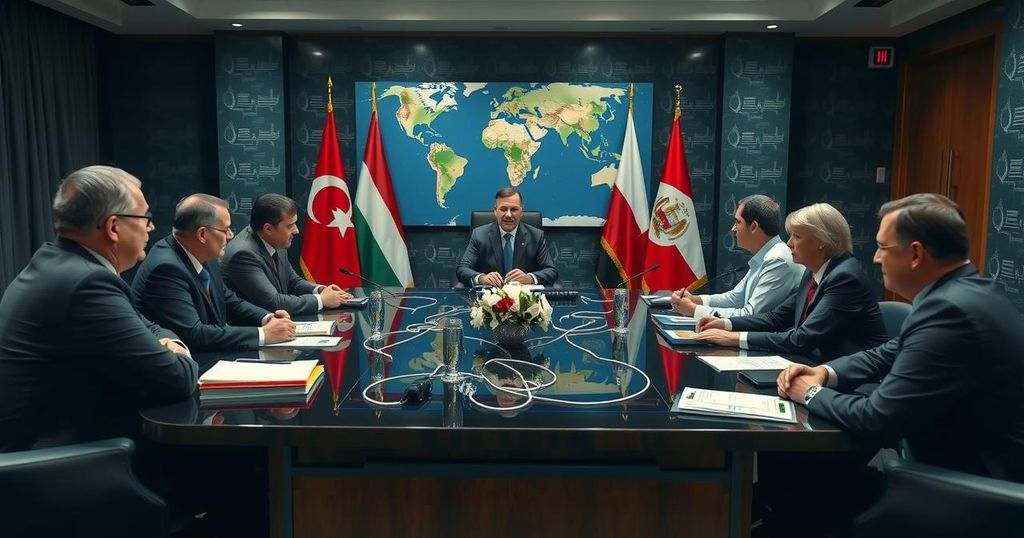U.S. officials are increasingly alarmed by the strengthening partnership among China, Russia, Iran, and North Korea, dubbed a new ‘axis of evil.’ This coalition is actively supporting Russia in the Ukraine conflict through military cooperation, raising concerns about destabilization and global security. The implications of their collaboration have led to a wider discourse on international relations, similar to historical precedents from the late 1930s.
Concerns are escalating among U.S. officials regarding the deepening alliance between China, Russia, Iran, and North Korea, which some in Washington are characterizing as a new “axis of evil.” This trepidation was recently heightened by U.S. Defense Secretary Lloyd Austin’s confirmation during his visit to Rome that North Korean troops are now stationed in Russia, presumably to engage in the conflict in Ukraine. Prior to this, Russia had participated in joint naval exercises alongside Iran, indicating military collaboration between these nations. Throughout the ongoing conflict in Ukraine, China, North Korea, and Iran have lent their support to Russia’s military efforts. Iran supplied drones and missiles, North Korea provided artillery shells, and China contributed dual-use technologies including semiconductors and drone engines. U.S. Republican Congressman Rob Wittman noted the historical parallels between this situation and the emergence of the axis of evil in the late 1930s, emphasizing the importance of a unified response to nations that do not uphold democratic values and the rule of law. Historically, the term “axis of evil” was popularized by former President George W. Bush in 2002 to describe nations perceived as supporting terrorism, including North Korea and Iran. However, its contemporary usage reflects a broader application towards the aforementioned four nations. U.S. Secretary of State Antony Blinken has characterized these countries as revisionist powers that pose a challenge to the established international order. He emphasized the necessity for decisive action to counter this emerging threat. Wittman expressed concern regarding the collaborative capabilities of these nations, pointing out that their cooperation allows for knowledge transfer and advances in military technology at an unprecedented pace, which can destabilize global security more effectively than previous conflicts. Merrill Matthews, a scholar at the Institute for Policy Innovation, corroborated this assessment, indicating that these countries aim to expand their territories and influence and are endeavoring to construct a self-sufficient economic sphere that does not depend on Western economies. Christopher S. Chivvis from the Carnegie Endowment for International Peace highlighted that China’s participation is pivotal to the strength of this alliance. He posited that if China were not involved, the cooperative dynamics would appear significantly less threatening. This coalition could exploit crises in one region to distract from or escalate conflicts in others, further compounding global security challenges. For instance, a friction with China over Taiwan could embolden Russia to intensify its military activities in Ukraine or NATO territories. In summary, the interrelations among China, Russia, Iran, and North Korea reflect a shifting landscape of international diplomacy and strategy. Blinken concluded that while the relationship is “largely transactional,” their joint efforts are driven by a shared commitment to oppose U.S. influence and challenge the existing international order. This cooperative dynamic signals increasing tensions that require urgent attention from the global community.
The increasing collaboration between China, Russia, Iran, and North Korea has acquired serious implications in the context of international relations, particularly in light of the ongoing conflict in Ukraine. With each nation providing varying levels of support to Russia, the concept of a new ‘axis of evil’ has emerged in U.S. political discourse. This grouping poses a significant challenge to the existing geopolitical landscape and suggests a potential realignment of powers, reminiscent of historical alliances formed during tumultuous times. U.S. officials are particularly concerned about the revisionist ambitions of these states, which threaten established norms in international governance and security.
In conclusion, the formation of a cooperative bloc among China, Russia, Iran, and North Korea presents a formidable challenge that could destabilize global peace and security. This alliance, reminiscent of historical threats, has the potential to exploit crises across regions, thereby necessitating a strategic reassessment by the international community. U.S. policymakers must remain vigilant and proactive in countering the ambitions of these nations, as their combined efforts could undermine the principles of democracy and international stability.
Original Source: www.voanews.com






